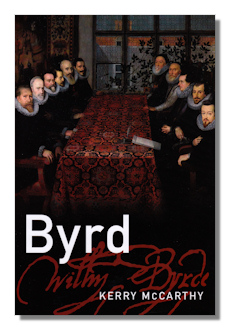
The Internet's Premier Classical Music Source
Related Links
-
Introduction
Acoustics
Ballet
Biographies
Chamber Music
Composers & Composition
Conducting
Criticism & Commentary
Discographies & CD Guides
Fiction
History
Humor
Illustrations & Photos
Instrumental
Lieder
Music Appreciation
Music Education
Music Industry
Music and the Mind
Opera
Orchestration
Reference Works
Scores
Thematic Indices
Theory & Analysis
Vocal Technique
Search Amazon
Recommended Links
Site News
 Book Review
Book Review
Byrd

Master Musicians
Kerry McCarthy
Oxford University Press (OUP) 2013, pp xvi + 282
ISBN-10: 0195388755
ISBN-13: 978-0195388756
Given his importance in the history of music, and influence in late Renaissance (British) music in particular, it's something of a surprise that there are so few substantial books on William Byrd (1539/1540?-1623) currently available. William Byrd: Gentleman of the Chapel Royal by John Harley (ISBN-10: 1859281656; ISBN-13: 978-1859281659) is a standard biography and introductory work. But there are few (more recent) accessible and readily available studies of Byrd and his music. So Kerry McCarthy's study in the Oxford University Press' "Master Musicians" series is all the more welcome.
In over 250 substantive pages McCarthy provides an excellent survey of the composer's life and music. The book is actually divided into a dozen and a half chapters each dealing – in from half a dozen or so to, again, a dozen and a half pages – with a period of the composer's life and/or a particular composition or group of published works. The last couple of chapters describe and comment on Byrd's reception and influence.
McCarthy has aimed at comprehensiveness rather than depth in this study. Byrd lived a long life (over 80 years) and was prolific; he was also active in many religious and political institutions of his time. Add to this the implications of being a Catholic in Protestant times and it's obvious why there's as much ground to cover as there is. McCarthy covers it well. There are plenty of musical examples, structural discussion and analysis of the musical and cultural contexts of Byrd's compositions'. No footnotes or references, though. But the book is well-indexed – both of his works and generally.
Additionally, the book has five useful appendices… a three-page chronology (perhaps misleadingly entitled "Documents of Byrd's Life"); a list of works using the Stainer & Bell Byrd Edition for the vocal and string, and Musica Britannica for the keyboard, works; a 50+ Personalia; a select bibliography; and – perhaps most useful of all these – a "Reader's Guide" to the literature current to very recently and including online sources.
Kerry McCarthy is well-placed to have produced this survey. For the past ten years she has taught at Duke University (Durham, North Carolina), where her research has concentrated on the (cultural context of) music of the Renaissance in Britain. A previous recent publication of hers concentrated on the Gradualia. Her style is down-to-earth yet authoritative. Unnecessary "packing" is entirely absent. She uses her 250 pages well. Yet manages not to make assumptions which might leave a non-specialist reader wondering about allusions and aspects of Byrd's life or music referred to obliquely or elliptically. Where McCarthy has felt it necessary to explain a relevant geographical or cultural/historical issue, she has done so succinctly and without impeding the flow of her narrative… the ties between the arts, for instance, and their effect on Byrd's work; and the occasions in the liturgical calendar for which certain of Byrd's compositions were intended.
The book is particularly strong and reliable on assessing the relationship between Byrd's biography and career on the one hand; and his music on the other. Again – with a career of over 500 works in almost every genre of the time lasting nearly 60 years – McCarthy can be forgiven a certain pragmatism that all but requires some compression. Yet at the same time, the fact that Byrd's life was unusually well-documented, and that many of the relevant documents have come down to us (Byrd was an inveterate litigator) have rightly predisposed McCarthy to treat life and music as intertwined, if not quite equal interest. Byrd's music, in other words, can only truly be understood by reference to his life. While some would dispute that, McCarthy makes her case well.
The author has also surmounted well some of the difficulties which biographers of Renaissance musicians face: the fact that many of Byrd's (not an uncommon English surname) works cannot be dated; the fact that there are gaps in his known chronology – its first two decades, for example; and of course the fact that a certain amount of obfuscation by Byrd and his contemporaries was surely necessary in view of the persecution of Catholics. She acknowledges her debt to specialists in the field like Harley, Oliver Neighbour, Richard Turbet and Joseph Kerman (whose New Grove volume on Byrd is also worth reading); this book is dedicated to the latter.
On top of this, McCarthy is thorough, illuminating and penetrating in her analyses. Her material is well set out; her conclusions are well supported; and her enthusiasm for Byrd's music is more than an incidental advantage for us readers. In fact she identifies a target audience for the book: those who (already) sing and/or play Byrd's music and wish to understand, and perform, it better by having a greater knowledge of the composer. McCarthy has managed very well to strike a balance that is likely to please most constituencies: the majority of the relevant surviving material is presented here; or, at least, it informs the author's deft discussion and conclusions about Byrd. It's well contextualized; the exposition is nicely articulated; it will suit most who want to explore Byrd in any depth. A reasonably-priced title that can in every way be recommended.
Copyright © 2013 by Mark Sealey.



















